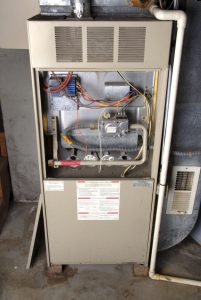 Gas furnaces are not automatically dangerous devices. This is something we want to clear up right away so you won’t feel panic just because your home has a natural gas-powered furnace for heating. However, like most powerful appliances or any appliance that creates combustion gases, a furnace can potentially create health hazards if it isn’t maintained regularly or repaired as soon as symptoms of a malfunction appear. Treat a gas furnace well and you should have few worries about its performance.
Gas furnaces are not automatically dangerous devices. This is something we want to clear up right away so you won’t feel panic just because your home has a natural gas-powered furnace for heating. However, like most powerful appliances or any appliance that creates combustion gases, a furnace can potentially create health hazards if it isn’t maintained regularly or repaired as soon as symptoms of a malfunction appear. Treat a gas furnace well and you should have few worries about its performance.
However, we want to caution you about the most common cause for a gas furnace to become unsafe: cracked heat exchangers. This is most likely to happen in an old furnace (more than 15 years old), which is why we recommend looking into a replacement sooner rather than later. Regular maintenance helps catch this problem early so you’ll know it’s time to arrange for a heating replacement. In some situations, a targeted furnace repair may fix the problem.
What Is a Heat Exchanger?
It’s an important part of a natural gas furnace: the spot where the heat from the combustion gas transfers to the air from the blower fan that moves into the ventilation system. The combustion gas can’t come into direct contact with the air, otherwise unhealthy fumes would end up going into the living spaces. Instead, the combustion gas enters the heat exchanger, a metal clam-shaped chamber. The heat of the combustion gas raises the temperature of the metal, and as the air from the blower passes around it, heat transfers to it. Basically, the heat exchanger is where the furnace heats the air!
Why Is a Cracked Heat Exchanger a Problem?
Because it allows the exhaust fumes inside the exchanger to leak into the air. The most toxic of these exhaust fumes is carbon monoxide, which can cause severe health problems. The furnace usually sends the fumes out a flue, but a crack can allow some to seep out.
The most likely cause for a crack in the heat exchanger is corrosion. The reaction between the combustion gas and metal over time may create this weakening of metal. This is why it’s something to watch out for in an old furnace. Even a small crack is an issue, since it will stretch wider as the heat exchanger turns hot and expands.
If you notice a clicking sound from the furnace after the blower shuts off, you may have a cracked heat exchanger. You must also call for HVAC professionals assistance if the CO detectors in your home go off. (These detectors are a must if you use natural gas in your home.)
You want to have the best possible HVAC company in Florence, OR to help with any type of furnace repair, from a small electrical fix to something as critical as a cracked heat exchanger. These aren’t jobs for amateurs or for DIY experiments! Trust these jobs to us: we have more than 50 years of history servicing HVAC systems of all types and sizes, and we offer 24/7 emergency service.
Comfort Flow Heating serves all of Oregon. We are small enough to listen, large enough to deliver.

